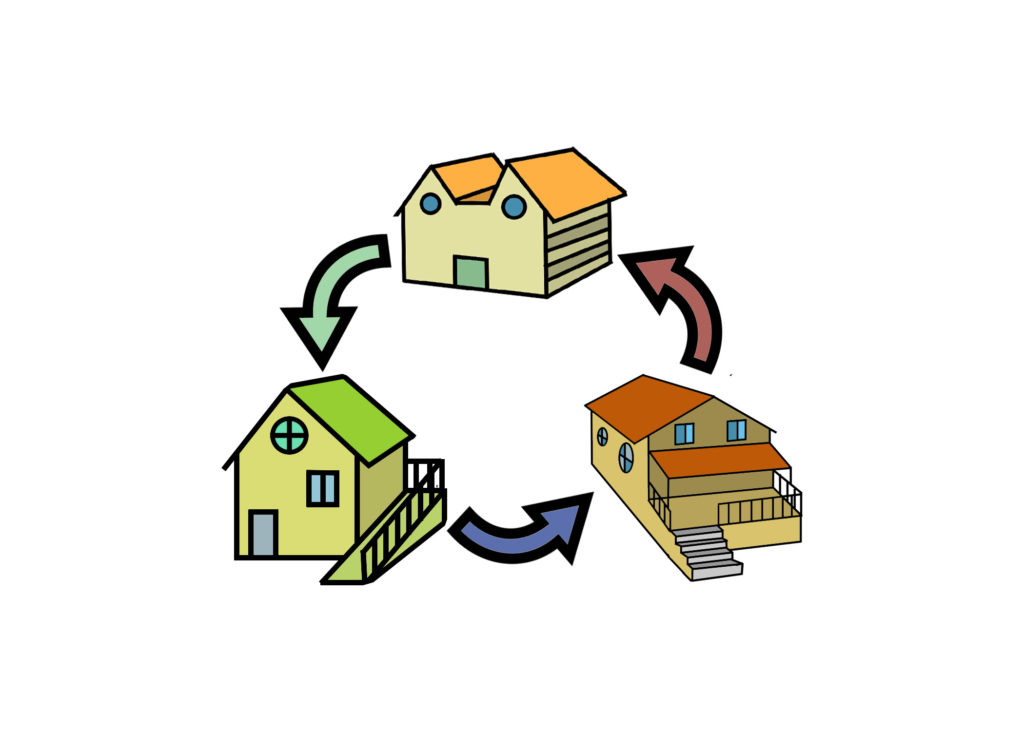By Kelly Page
pagekell@grinnell.edu
The 2019-2020 academic year will see the introduction of two new project houses: GAME House and Coding House. The two additions will cause some of the established project houses to shuffle around: Food House will move to the current location of Art House, Art House will move to French House’s current address and French House will move next in to what is currently the Faculty House on Park Street. Eco House will cease to exist.
The changes to Food House and Eco House, both of which have existed in their current locations for the past ten years, have presented difficulties to the respective residents of those houses.
1128 East Street, currently occupied by Food House, will become GAME House next year. GAME, which stands for Grinnell’s Alternative Method of Entertainment, has existed at Grinnell as an informal student group for the past year. Members of the Grinnell cross-country team created it to give students ways to have substance-free fun on the weekends. The students have hosted board game nights, hide-and-go-seek, comedy events, art nights and dance parties.
Nicky Midlash ‘21, one of the house’s future residents, said that it was important to them to have a defined sub-free house for events. Leah Reuber, assistant director of residence life and a member of the board that made decisions about project houses for the upcoming year, agrees.
“We have halls that are substance free, but there’s only so much isolation you can get from substance use in the halls, just by nature of being connected to other halls, and so [GAME House] gives a little more space between those two things on the weekend, which I think some students are looking for,” Reuber said.
The other new project house, Coding House, aims to create an inclusive environment for Grinnellians to learn and collaborate around coding regardless of level of experience.
Amanda Weber ‘21, who was part of the group that presented Coding House to the Residence Life committee, explained the origins of the concept of Coding House. “For a long time I was an English and Russian major and coding didn’t seem super accessible to me as someone who had taken one CS class, and I think that was what drove a lot of our idea behind this house … like, creating a space that made something fun and really useful more accessible to people who might not necessarily have as much academic access to the knowledge behind coding.”
Charun Upara ‘21, another future resident of Coding House, added, “We want to host events like Hackathons and teaching people about CS in a house and having mock interviews for people who want internships and stuff like that, so they can have a space to learn more about computer science in general, too.” The residents of the house plan to work on a coding project together which will put all of their computer skills to use, regardless of what individual’s skill level may be.
Due to the limited number of project houses, Eco House will no longer exist next year, leaving many Eco House residents “heartbroken,” according to Molly Nelson ‘21, who currently lives in the house.
Reuber, the assistant director of residence life, said, “We just had really great presentations this year, and the five we selected were the five top presentations.” The “top presentations” are determined by a committee of Residence Life Coordinators and staff and three students who use a rubric.
Reuber added, “With long-standing houses or houses that are maybe more established, we want to see sort of growth.”
Nelson, however, said that Eco House residents were unsure why they were not re-approved this year because “we were certain that we had improved from the last year.” Eco House has hosted multiple events this year, including Harvest Fest, a Baking and Board Games Night and movie nights. The house has embraced vegan eating and composting, and have become “like a family,” according to Tal Rastopchin ‘21, who also lives there.
Reuber said that each project house, in its proposal, lists its house location preferences, and that project houses who are given higher scores on their application materials get more privilege when house locations are being assigned. She added, “There is a certain hierarchy on presentations that are a cut above the rest.”
Food House residents currently believe that they were not given their first choice house, which Food House has occupied for a decade, because they turned in their application form late, despite Residence Life not making the Food House students aware of this mistake at the time of their Residence Life committee presentation.
This relocation will present major difficulties to Food House. Food House will have to downsize from 12 to eight residents as the result of the move and will have to work with a much smaller kitchen, it may be more difficult for them to produce food for the Grinnell community at the same rate as they have in previous years. Reuber said that Residence Life is currently working to determine how to make changes to 1008 Park St. to make it more suitable for their aims.
However, Food House resident Temitayo Wolff ‘19 still believes that Food House’s current location is important to its functioning as a house. “The ideas for the project houses that are going to be here and next door next year have a lot of value, but also I think it’s a real bummer and an oversight on the part of Res Life to move Food House,” Wolff said. “They maybe don’t understand how Food House works and how the amount of space we have in the kitchen and the number of rooms are really integral to the functioning of the house, so I’m interested to see how it goes next year, and I’m sad, and I’m less mad now, but also I think change can be good.”


























































